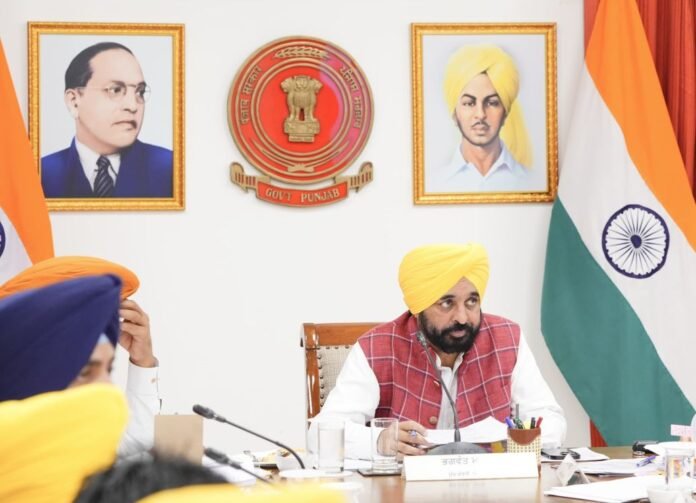In a landmark move aimed at protecting the interests of farmers and ensuring the supply of quality agricultural inputs, the Punjab Cabinet led by Chief Minister Bhagwant Singh Mann has approved the introduction of The Seeds (Punjab Amendment) Bill 2025, which declares the sale of spurious seeds a non-bailable offence. The decision was taken during a Cabinet meeting chaired by the Chief Minister in Chandigarh, marking a decisive step toward safeguarding Punjab’s agrarian economy. The amendment seeks to enhance penalties under Section 19 of the Seeds Act, 1966, which had not been updated since its inception. The Cabinet endorsed the insertion of a new Section 19A into the Act to ensure stringent punitive measures for violations under Section 7 related to the regulation of sales of notified seed varieties. The Bill proposes a fine of Rs 5 to 10 lakh and imprisonment of one to two years for a first-time offence committed by a company, escalating to a fine between Rs 10 to 50 lakh and imprisonment of two to three years for repeat offenders. Individual dealers or persons found violating the law for the first time will face a jail term of six months to one year and a fine ranging from Rs 1 to 5 lakh. Repeat offences by individuals will attract imprisonment of one to two years and a fine of Rs 5 to 10 lakh. The previous penalties, considered outdated and insufficient, were limited to a fine of Rs 500 for first-time offenders and Rs 1,000 and up to six months of imprisonment for repeat offences.
The Cabinet also approved the establishment of a robust mechanism to allocate land parcels either on sale or lease basis to promote industrial investment across the state. Recognizing the lack of a formalized, time-bound framework for allocating land to potential investors, the government has cleared a comprehensive model that includes digital land pooling conducted bi-annually, investor facilitation for projects exceeding Rs 200 crore, reserve price determination, feasibility checks, an e-auction process, lease options, and auction timeline protocols. This initiative is aimed at enhancing ease of doing business and accelerating economic development in Punjab.
Providing major relief to aspiring candidates, the Cabinet amended the Punjab State (Group D) Service Rules, 1963, by increasing the upper age limit for recruitment from 35 years to 37 years. This change aligns the age criteria with the existing norms for Group A, B, and C posts under PCS Rules 1994. The Cabinet also modified the minimum educational qualification required under Rule 5(d) from ‘Middle’ to ‘Matriculation,’ modernizing the recruitment requirements for entry-level government positions.
In a move to support small and medium enterprises, the Punjab Cabinet approved the introduction of a One-Time Settlement (OTS) Scheme for the resolution of loans provided under various schemes including interest-free loans, seed margin money, Punjab State Aid to Industries Act, 1935, and the Integrated Rural Development Program (IRDP). Under this scheme, complete waivers of principal and interest will be granted for eligible loans. Beneficiaries will be required to avail the scheme and clear their dues within 180 days from the publication of notice in leading newspapers.
To ensure safe storage and maintenance of food grains during the upcoming Rabi Marketing Season 2025–26, the Cabinet granted ex-post facto approval for the re-tendering process involving the purchase of 46,000 LDPE black polythene covers. The tender timeline has been reduced from the conventional T+21 days to T+14 days to allow fumigation before the onset of monsoon, thereby protecting open wheat stock valued at approximately Rs 30,000 crore from adverse weather.
The Cabinet also revised the Punjab District Mineral Foundation (DMF) Rules in accordance with updated Government of India guidelines under PMKKKY, 2024. These revisions aim to increase transparency, ensure five-year perspective planning, prioritize high-need sectors for DMF fund utilization, and impose restrictions on the diversion of these funds.
Further, the Cabinet approved amendments to the Advisory Managing Committee of Shri Kali Devi Ji and Shri Raj Rajeshwari Ji Temple in Patiala. Under the new amendments, the Chief Minister will now be authorized to nominate the Chairman and members of the Advisory Managing Committee. Changes were also cleared regarding the financial authority of the Chairman, Secretary, Members, and the Management Committee of the temple trust.
To streamline operations and align benefits, the Cabinet approved amendments to the Punjab Value Added Tax (VAT) Rules, 2005. According to the new provisions, the Chairman and other members of the Punjab VAT Tribunal will now be entitled to House Rent Allowance (HRA) and Dearness Allowance (DA) at rates applicable to officers of the Punjab government.
The Cabinet gave its approval to the Punjab Food Grains Transportation Policy 2025 and the Punjab Labour and Cartage Policy 2025, designed to streamline the movement of food grains across the state. Under the new policies, all transportation contracts for food grain movement will be awarded through a transparent and competitive online tendering system, ensuring efficiency, cost-effectiveness, and accountability in procurement operations. These policies will enable the smooth transfer of food grains procured by state agencies and the Food Corporation of India (FCI) from designated mandis to storage locations.
In a final yet vital decision aimed at enhancing veterinary healthcare in the state, the Cabinet extended the services of 479 Veterinary Pharmacists and 472 Safai Sewaks working across 582 veterinary hospitals. Their tenure as service providers has been extended from April 1, 2025, to March 31, 2026, ensuring uninterrupted delivery of animal health services.
This Cabinet meeting reflected the Punjab government’s proactive governance approach with reforms and welfare-centric decisions, touching key sectors like agriculture, industry, public service recruitment, food security, and religious administration. These initiatives, introduced with speed and transparency, further underline the Mann government’s intent to bring comprehensive and inclusive development to the people of Punjab.





